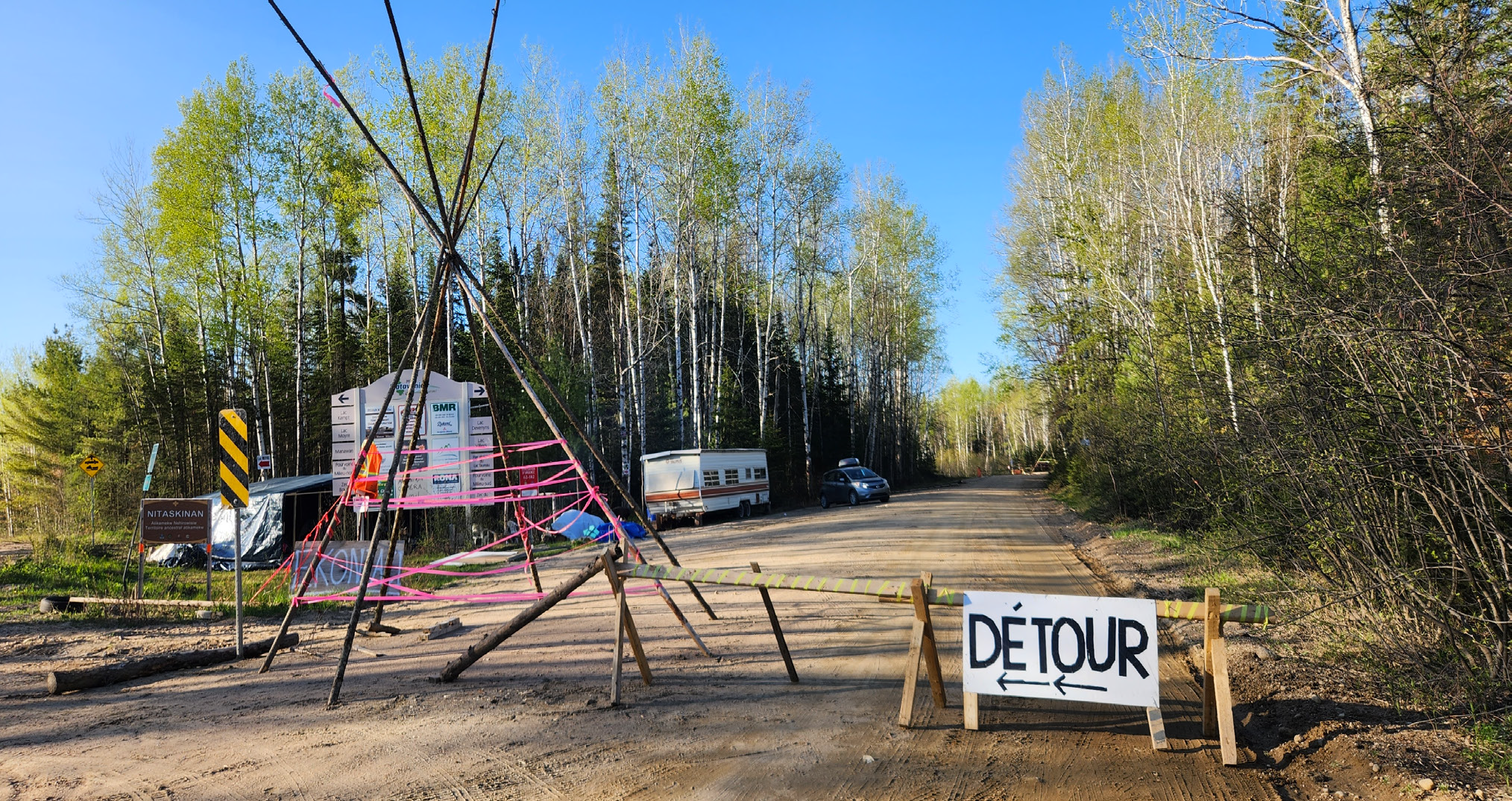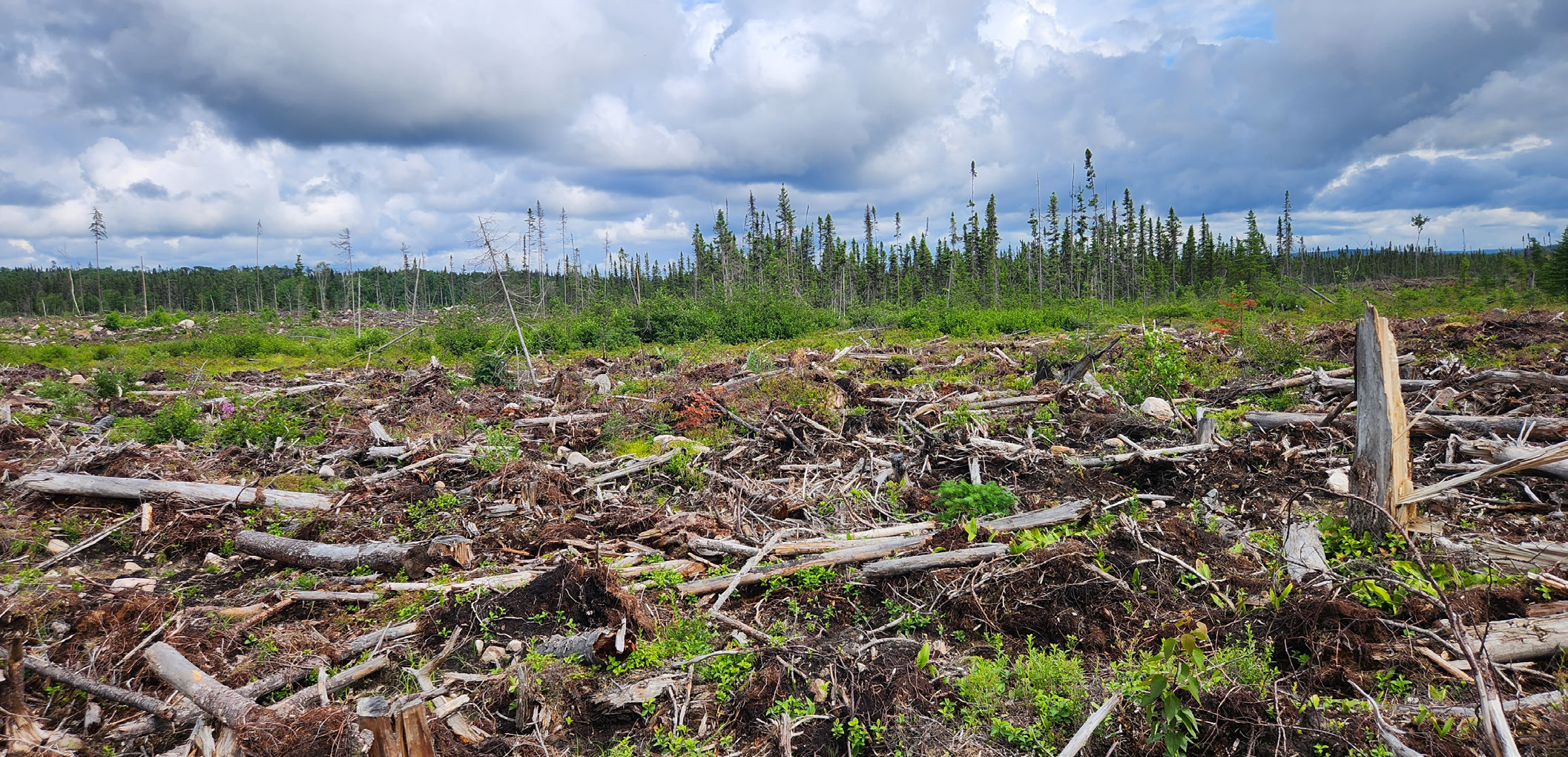For several years, indigenous movements have been advocating for the acknowledgment of their ancestral rights to their territories and complete sovereignty over them. This is exemplified by the Ekoni Aci (Atikamekw) movement and the Mashk Assi (Innue) Collective. These communities are at the forefront of the battle to safeguard their lands against logging and mining encroachments while advocating for the recognition of their ancestral rights.

For several years, indigenous movements have been advocating for the acknowledgment of their ancestral rights to their territories and complete sovereignty over them. This is exemplified by the Ekoni Aci (Atikamekw) movement and the Mashk Assi (Innue) Collective. These communities are at the forefront of the battle to safeguard their lands against logging and mining encroachments while advocating for the recognition of their ancestral rights.
Forest defenders demand to be consulted regarding any activities conducted within their territory. In their pursuit of complete sovereignty over their lands, these movements align themselves with the broader Land Back movement. They resist the dispossession and economic colonialism perpetrated by large forestry and mining corporations, which extract resources and retain the profits, often with the complicity of various government levels.
In a November 2021 letter addressed to the Prime Minister of Quebec, where they called for a 5-year moratorium on logging across their territory, the chiefs of the Atikamekw ancestral lands proclaimed, "These logging operations are abusive, excessive, and conducted without regard for our rights. Forestry developments show no consideration for our way of life and our capacity to engage in traditional activities. This practice, which contradicts our rights, must cease immediately."1 Regrettably, the decree of this moratorium was promptly disregarded by the provincial government and forestry companies, who continued their activities as if nothing had occurred.
The territory provides sustenance and traditional medicine to community members, forming the core of their way of life. The unchecked exploitation of resources without any recompense for the indigenous people who rely on them results in the dismantling of their traditional economy and, in turn, their way of life. Following the classic colonial pattern, logging companies conducting extensive clear-cutting only offer token compensation to the communities, such as firewood or free snow removal from the roads, all while amassing millions of dollars in profits each year.
Blocking the road to exploiters
In early 2022, despite the moratorium decree, the Champoux Group, operating the St-Michel-des-Saints sawmill, engaged in illegal logging within a traditional maple grove, sparking outrage within the community. Backed by the Band Council, the community established its initial roadblock at kilometer 60 of Chemin de la Manawan. The blockade, led by the "60 Movement," effectively barred any machinery from advancing beyond that point and remained in place for over a year.
In February 2023, the Wemotaci community followed suit and implemented multiple barricades on forest road 25, near La Tuque in Haute-Mauricie, effectively barring all machinery, including those of the deforestation giant Remabec. Despite an injunction from Remabec and the disapproval of their band council, the families of Wemotaci chose to maintain the blockades. This marked the inception of the "Ekoni Aci" movement, which translates to "Enough" in Atikamekw, uniting territory defenders from the communities of Manawan and Wemotaci.

A grassroots movement
The Atikamekw Nation Council (ANC), representing three communities: Manawan, Wemotaci, and Opitciwan, has been engaged in a negotiation process for over 30 years with provincial and federal governments to secure recognition of Atikamekw territorial rights within Nitaskinan (their traditional territory). In the spring of 2023, undoubtedly due to the economic pressure exerted by the two blockades, the negotiation process gained momentum. Clearly feeling threatened by colonial authorities, the ANC and the Manawan Band Council then reversed their stance by withdrawing support for the blockades and calling for their removal during the negotiations.
This attempt to stifle the resistance of the Atikamekw communities, understandably, rekindled the blockades. In May of the previous year, in response to their dissatisfaction with the direction of the negotiations and in open defiance of the ANC and the band councils, several families took action by establishing a second barricade at the 16th kilometer of the Manawan road. This location held strategic significance as it allowed the blockage of two routes commonly used by logging companies. The directives were clear: no more machinery was to enter the territory. However, residents, passers-by, including vacationers, and trucks transporting timber were still permitted to circulate.2
In that same month, the pressure intensified as the Mashk Assi Collective, consisting of Innu individuals from Mashteuiatsh, established a blockade on a forest road at the 216th kilometer of Route 175 within the Laurentides wildlife reserve in Saguenay. Eviction notices were issued to all companies operating in the territory, including the pulp and paper multinational Resolu, the Forestra Group, and the Lignarex Group. These notices explicitly demanded the "immediate cessation of all [...] forestry activities and vacating our territory."3 Beyond the immediate halt to logging operations and the expulsion of harvesters, the guardians of Nitassinan (the ancestral Innu territory) also called for a logging moratorium. Additionally, the collective voiced opposition to the Petapan Treaty, which seeks to extinguish the Innu's ancestral rights to their territory.
Forest fires
In a dramatic turn of events last June, all blockades had to be dismantled due to the proximity of several large forest fires. The territory guardians redirected their efforts towards the direct defense of their living environment by actively engaging in the battle against these raging fires on the doorstep of their homes. The rapidity and ferocity of these forest fires serve as a tangible manifestation of the climate crisis, the repercussions of which we are just starting to experience. Indigenous communities, whose lives are intertwined with and reliant on the forest, were among the first to bear the brunt of these impacts.
During the summer, a coalition comprising the Mashk Assi Collective, the Ekoni Aci Movement, and the Kanien'kehà:ka Kahnistenera (also known as the Mohawk Mothers) made a public declaration, reiterating their call for a logging moratorium and urging for a public inquiry into the origins of the forest fires rampant across the province. As stated in their open letter: "The government, through its mismanagement of the forest, has created this situation of extreme danger for which it is responsible. By prioritizing profitability, the government has fostered monoculture coniferous forests that turn into veritable tinderboxes in dry and hot weather, posing a risk to public health. [...] This forest management is centered on maximizing cutting potential, industrial development, and immediate profit."4
The struggle continues!
Forest protection movements serve as compelling examples of tangible resistance against extractivism, capitalism, and colonialism. As highlighted, "While Rémabec reported an annual income of $277 million in 2021, the unemployment rate in Wemotaci stands at 30%, and 25% in Manawan, which is over 6 times the provincial average. The stark contradiction between the wealth extracted from Atikamekw lands and the profound impoverishment of its inhabitants played a pivotal role in propelling them to establish this movement."5 As of the current moment, members of the Mashk Assi Collective have reinstated their roadblock, and the blockade remains in effect.
It is crucial for environmental movements and anti-colonial allies to stand in solidarity with grassroots Indigenous struggles. Amidst the climate crisis, the environmental movement should attentively heed the voices of other communities in the struggle, consider the concerns of those most affected, prevent divisions within the movement, and refrain from perpetuating colonial dynamics. By doing so, we can harness strength through the diversity of practices and collective experiences.
Notes:
1. Nitaskinan, November 2, 2021. https://www.atikamekwsipi.com/public/images/wbr/uploads/telechargement/Lettre_PM_FLegault_CoupesForestie-res_211102.pdf
2. Trucks are authorized to transport trees that have already been cut to prevent the waste of wood, which could otherwise decompose on-site and potentially harm ecosystems by releasing significant amounts of mercury into the environment, among other consequences.
3. https://ici.radio-canada.ca/nouvelle/1982762/innus-territoire-industrie-forestiere
4. https://pivot.quebec/2023/06/21/les-forets-ne-peuvent-plus-etre-le-terrain-de-jeu-de-lindustrie/
Fundraising for the Ekoni Aci Movement: https://www.gofundme.com/f/mouvement-60-pour-la-defense-du-nitaskinan
Fundraising for the Mashk Assi collective: https://www.gofundme.com/f/aidez-mashk-assi-a-defendre-de-nitassinan

